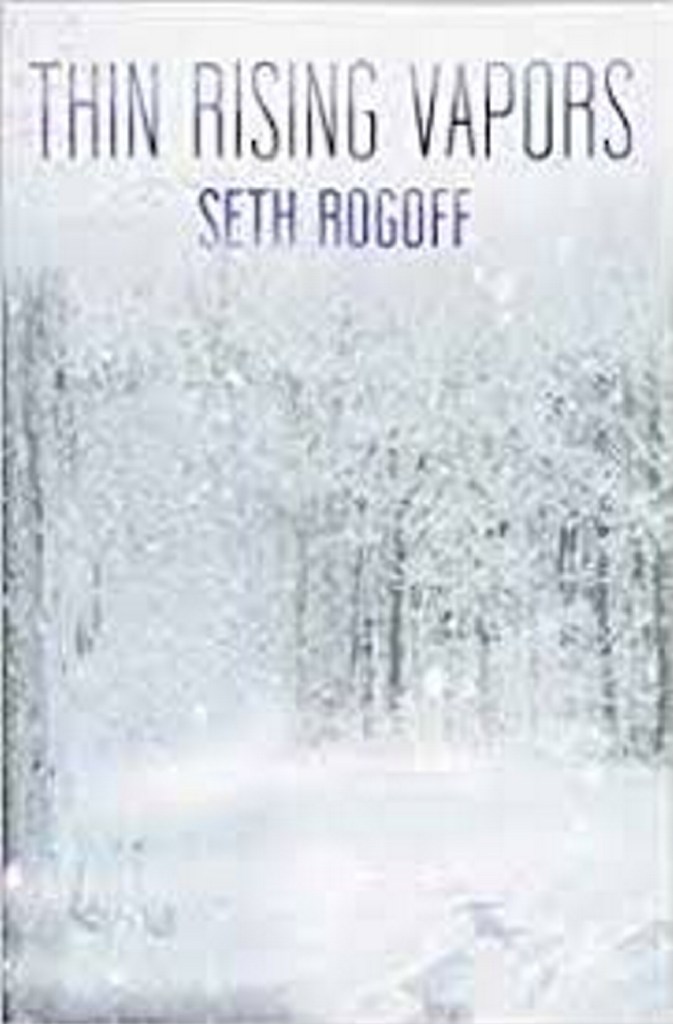Reviewing Seth Rogoff’s first novel, “First, the Raven,” in these pages, I said he was one of the most beguiling writers I had read in a long time. I stand by that opinion after finishing his new book. “Thin Rising Vapors” takes its title from a line in Walden: “so by the divining-rod and thin rising vapors I judge; and here I will begin to mine.” The mere act of reading the book gives pleasure, even when the story line is perplexing, sometimes seemingly arbitrarily so.
Arbitrariness is inevitable when the larger half of the book consists of sections picked at random from the immense, inchoate journal of a dead man named Abel Prager. Ezra Stern, the narrator, picks blindly from the stacks and stacks of typescript, and we follow him every inch – or line – of the way as he tries to decipher them. (The pages are printed as typescript in the book.) Rogoff, the author, is picking, too, of course, and not at all blindly. The result is the kind of meta mental gymnastics he deployed so creatively in his first book.
“[T]hat which remains beyond the borders drives my literary work,” Rogoff writes of himself, “because if these failures, mistakes, unanswered questions, impulses, and speculations are treated honestly, they can’t be sanitized and contained in conventional narrative forms.”
In this novel, the dead journaler is Stern’s childhood best friend. Once a star international environmentalist, Abel Prager has inexplicably retreated to the woods of Casco, Maine. One of his passions is Henry David himself, which allows Rogoff to explore Abel as a latter-day Thoreau. (The author’s familiarity with Casco’s social dynamics suggests he has spent summers, and even winters, there, too.)
For the next six years, Prager has whiled away a largely solitary existence on Pleasant Lake (instead of Walden Pond), obsessively typing up his experiences on an ancient Remington typewriter. When Prager unexpectedly dies, Stern rushes to Casco, where he is steadily drawn into this sometimes nightmarish testament of memory and invention.
There is much too much to absorb in the endless stacks of paper. Jumping from ream to ream, Stern wonders if he already has wrecked his chances of understanding Abel’s death – or life – by moving them around. “It could even be that they remained in order now, though organized around a principle that I could not see and did not understand.”
While a snowstorm rages outside, what was meant to be an overnight stay in Prager’s unlit, unheated house is extended, day by day. Where in Rogoff’s other book, a blizzard contributed to its overall claustrophobia, here it poses an existentialist question: the elements that are snowing Ezra in, are they external or internal?
In the same vein, Stern/Rogoff vacillates between starting at the beginning or the end. The beginning? “I paused and considered this, finally rejecting it, not on the basis of its merits but because I had made a decision and wanted to stick to it, to see it play out.”
As he reads, Stern revisits his memories of the friend he knew at a boys’ camp and in school. Prager’s own memories and accounts of his life provide an increasingly intense counterpoint. Rogoff has the ability to limn a character, as it were, at second hand. All the reader knows about Abel Prager comes from his disjointed literary output. Though always admired by Stern, his brilliant friend reveals himself to be arrogant, judgmental and impossible. He frequently feels “repulsed” at the needs of others. “There is no trusting anyone who tries to explain himself. The result isn’t metaphor but lie,” he snaps at one of two sisters, whose family summers in Casco.
These sisters are the exceptions to Prager’s self-imposed solitary exile. Is it his selfishness or their idiosyncrasies that will doom any possible relationship? Does he even want one? Rogoff slyly underlines Prager’s emotional immaturity with his collection of quotes that are among the Sage of Walden’s most self-inflated. Stern himself realizes, “Abel should have been well beyond Thoreau by now, well beyond these pond-side musings.”
In the end, Stern must accept that whatever he has learned about his friend pales into insignificance compared with what he doesn’t know about him. Perhaps that is enough. Snowstorm ended, Stern is very happy to rejoin the world: his wife and children, and the college where he teaches medieval history, and where, the reader learned on the opening page, Prager’s literary oeuvre has been stashed, untouched, in Stern’s office ever since.
Back in Casco during the blizzard Ezra Stern developed a daily routine, which I recommend. Fetch the logs from the woodpile, light up the Franklin stove, pull up the rocking chair. Now savor the beguiling uncertainty of “Thin Rising Vapors.”
Thomas Urquhart is a former executive director of Maine Audubon; he is writing a history of Maine’s settlement and the Public Lots. Find him at turq1000@gmail.com.
Send questions/comments to the editors.


